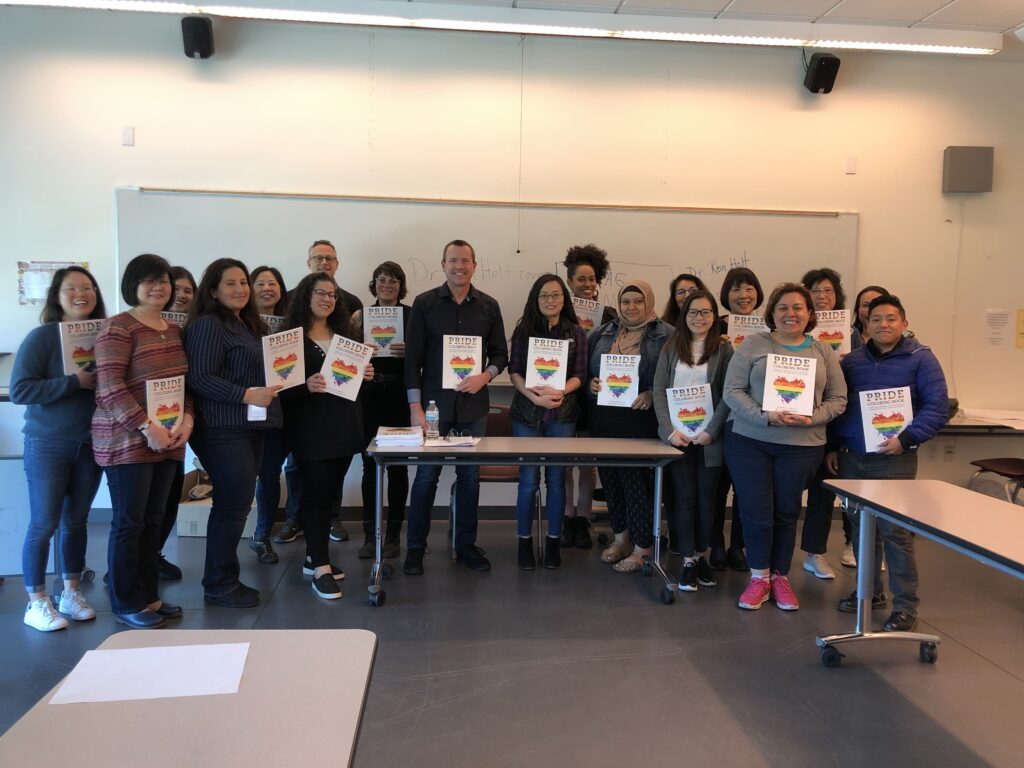LGBTQ+ Medical Case Scenarios: An Experiential Learning Perspective
The presentation consisted of reviewing LGBTQ+ medical case scenarios through the lens of City College of San Francisco medical interpreter students. The class divided into small breakout groups, which allowed an experiential learning perspective. After discussing a particular case as a smaller group, the group would present the case to the whole audience with Dr. Holt as the facilitator.
The audience consisted of medical interpretor students. Afterwards we had a signed book distribution of the PRIDE Coloring Book, which were donated to the students compliments of Dr. Holt.
Audience feedback/impact of this presentation:
Dr. Ron Holt you are amazing. Thanks for your knowledge and sharing your own personal experience. I learned to be open, compassionate, sensitive, and to educate yourself. My interactions will improve, because I always think there is room for understanding others. It’s important to educate ourselves and just don’t go judging. Always love unconditionally.
Thank you so much for doing this lovely work. Thanks you for telling your story, for helping others to heal, and deal with all the nasty things that others say. The vignettes were nice, because they show real life scenarios and give others ways to deal with them. I learned to always show kindness and acceptance when someone opens up about who they are. I loved it all.
Very informative and learned lots of terminology. I will stay aware and sensitive in my patient interactions.
Thank you for coming today and teaching us a very important topic that I personally don’t know much about. I learned affirmation! I will be more careful of how I “label” people and not to “assume”.
Wonderful information. I heard all those terms all the time, but this time I think I have the best understanding. I learned a trans person can know as young as 2 years old. Accept the way it is and who they are.
I learned a lot. Wonderful presentation. I learned about different spectrums. This helped me understand better the LGBTQ community. I learned not to assume anything, because there are different and wide spectrums. Thanks, Dr. Holt.
Thank you for sharing three very unique cases for us to work through. I am so blessed/lucky to have grown up in the Bay with such a diverse family therefore acting as ally to so many different people. I learned to be delicate about terminology and always use the vocab/labels your patient uses. Always create safe space for the people you serve and take every opportunity to be inclusive and never assume.
Wonderful class. Learned a lot. Learned how to have an open and sensitive conversation with different members of the LGBTQ community. This will be a great help in both my personal and professional interactions with members of LGBTQ.
Very detailed information. Answered most of the questions. I learned how to maintain a good relationship with the person and how to support them. I feel more comfortable to ask questions if I need to.
These are nice examples and I have learned a lot from them. I learned how to support a friend/family when he/she is struggling with sexual orientation or gender identity. This helped me on how to be a more supportive interpreter when encountering LGBTQ patients.
It is a good class. I learned about LGBT.
The three scenarios are very real and useful. I learned don’t assume, show unwavering support and acceptance and lead by example. I never thought about someone stating sexuality, but behaving different.
l learned 40% of trans adults answered that they had suicide attempts. Trans patients are 9x greater risk for suicide attempt compared to cisgender. The next high risk of suicide demographic is bisexual men. I will honor and value the experiences of LGBTQ patients and use my awareness to be sensitive to the issues that the medical system presents to these patients. I will act as an advocate and a liaison when I see that medical staff are not respecting the patient.
After this presentation, I have more education about LGBTQ patients. I learned open-ended and gender neutral language can prevent bad situations. Respect one another’s beliefs.
I learned the importance to realize how individuals have difference needs. Do not label people, be impartial, but empathetic.
I have better understanding of LGBTQIA. I learned how to interact or communicate better when we meet people.
Informative and educational. I learned the difference between sex, orientation, gender, and gender nonconformity. I will seek to understand first.
Informative. I leaned ways to respond to someone coming out to you and identifying what LGBTQ is. Gained knowledge to help other people.
May be helpful to review with the group how DPH collects SOGI data. Non-binary is a term I hear more commonly than genderqueer. Heterosexual, cisgender people really struggle to understand SOGI.
